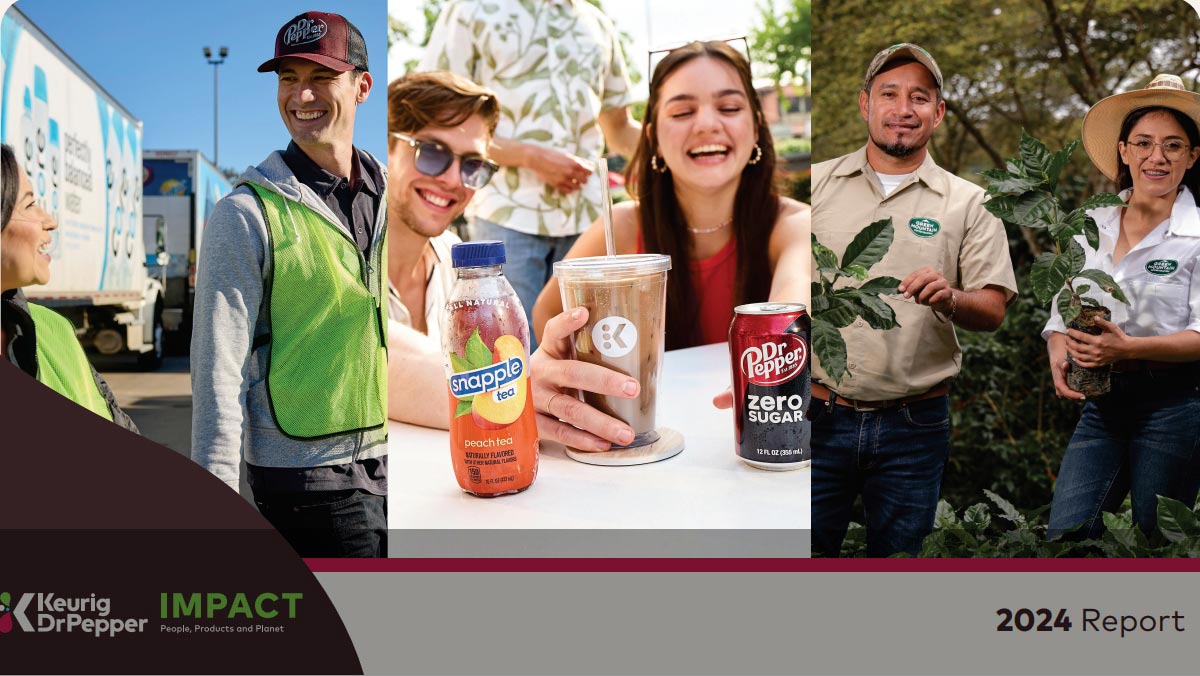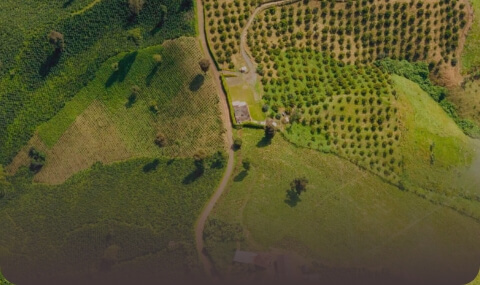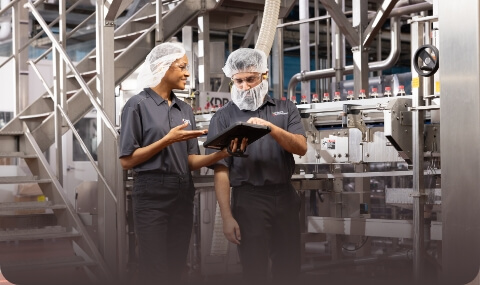Climate & Nature Action
Strategy
As a leading beverage company, KDP recognizes the risks that climate change presents to people and the planet. Addressing climate change and its impacts on nature is complex and requires scalable systems changes. Core to our approach is the use of credible standards, robust disclosures, intentionally designed roadmaps to goals, public policy support and collective action.

Energy Efficiency & Low Carbon Energy Use in Our Operations

Fleet Decarbonization

Partner & Policy Engagement

Regenerative Agriculture & Conservation
We assess climate change risks most important to our business via a climate scenario analysis and a fleet operations assessment. This helps us identify opportunities and implement climate mitigation measures for the communities and regions in which we operate. More details can be found in our CDP Climate Disclosure and our Task Force on Climate-related Financial Disclosures (TCFD).
Our efforts include pursuing energy efficiency in our operations and products and working to decarbonize portions of our fleet and manufacturing operations through renewable and low carbon energy sources and technologies. In addition, we focus on climate adaptation specifically in farming communities. Our approach is to work with partners to support regenerative agriculture and conservation initiatives within our coffee, corn and apple supply chains. A regenerative approach to agriculture production can create many benefits, such as enhancing soil health, improving water quality, mitigating deforestation and increasing biodiversity and ecosystem resilience. To measure progress toward our regenerative agriculture and conservation goal, we have developed an outcomes-based methodology outlined in KDP’s Regenerative Agriculture & Conservation Monitoring & Evaluation Guide.
Collective action is critical in addressing climate change impacts. Because Scope 3 emissions account for more than 97% of KDP’s greenhouse gas (GHG) emissions, we continue to engage with our value chain partners on a shared climate journey. We also know that governments play an essential role in addressing climate change. We join other corporate leaders in acknowledging the important role we have in establishing and maintaining open dialogue with governments in support of healthy economies, substantial reductions in GHG emissions and robust adaptation measures. We support the creation of incentives in clean energy and transportation projects, along with initiatives to streamline permitting processes for the faster deployment of clean energy and enhanced grid resiliency.
Management Approach
We leverage third-party standards and guidelines and collaborate with many industry organizations to inform our strategy, as well as comply with regulatory agency requirements to report our progress. KDP’s cross-functional teams, including Procurement, Operations, Engineering, Marketing, Research & Development (R&D), Legal and Sustainability, collaborate to advance our climate and nature goals.
We have established several policies that outline our approach and reinforce our commitment to climate and nature action. They include KDP’s Environmental Policy, Climate Policy, Water Policy and Supplier Code of Conduct.
reduction in combined Scope 1 and 2
emissions, compared to
the 2018 baseline
electricity obtained from
renewable sources in 2024

Increased KDP Canada’s electric fleet inventory to 45 vehicles, representing nearly 20% of our total Canadian fleet

Updated our 2030 GHG emissions-reduction targets validated by the Science-Based Target initiative (SBTi) to align to the Paris Agreement climate change goal of limiting global warming to well below 1.5ºC above pre-industrial levels

Supported regenerative agriculture and conservation on 129,013 acres of land since 2022, attaining the halfway point of our goal
We are working to reduce resource use while increasing resiliency measures to account for a changing environment.
- Year over year, we continue to increase our renewable energy purchases on our path to obtain 100% of electricity from renewable sources. As part of this effort, we are members of RE100, a coalition of businesses led by Climate Group and established in partnership with CDP, that works to help change policies to bring more renewables onto the grid.
- Since 2023, we have been members of the Renewable Thermal Collaborative, a coalition of manufacturers, state and local governments and suppliers that are committed to scaling renewable heating and cooling at their facilities and cutting carbon emissions.
- Through capital investments, supplemented by public funding, we are implementing energy savings initiatives in select manufacturing facilities to help minimize our overall energy consumption.
- We periodically hold energy optimization events at our manufacturing sites to identify energy and GHG emissions savings and to create cultures of energy efficiency management.
- We have secured Leadership in Energy and Environmental Design (LEED) Gold and Silver certification for our Frisco, Texas and Montreal, Canada headquarters, respectively.
- We continuously optimize the routes of our fleet with the aim to find the most time- and cost-efficient route so we can deliver the best value for our customers, while also reducing carbon emissions.
- As part of our effort to decarbonize portions of our fleet, we have steadily expanded our electric fleet in Canada. There are additional advantages to an electric fleet, including lower maintenance and operating costs and greater comfort in winter since the vehicles have a programming feature to be warmed for departure time. Moreover, in British Columbia, electric vehicles are given preference on expressways via a fast lane during peak traffic hours.
- In 2024, we became members of the Advanced Clean Transportation (ACT) Fleet Forum and Corporate Electric Vehicle Alliance as part of our efforts to advance the electrification of our fleet. Both organizations include a collaborative group of companies focused on accelerating the transition to electric vehicles and other carbon reduction fleet technologies.
- In 2024, we achieved our goal to engage bottlers and select suppliers representing 50% of Scope 3 emissions to set a science-based target. Going forward, achieving our Scope 3 reduction goals will continue to be dependent on our suppliers setting and making progress on their own emissions reduction goals. Because our combined efforts will contribute to reduced carbon impacts across our value chain, we are committed to continuing supplier engagement in 2025 and beyond.
- We participate in U.S. Environmental Protection Agency (EPA) Smartway, a program that helps the freight transportation sector and member companies achieve their freight supply chain sustainability goals by providing credible tools, data and standards for measuring, benchmarking and improving environmental performance.
- In 2024, KDP Canada voluntarily purchased carbon credits* with ECOTIERRA from the Shade Coffee and Cacao Reforestation Project in Peru, which is part of the Café Selva Norte (CSN), a coffee agroforestry project generating VSC-Certified credit that KDP has been financing for more than three years. These credits are the first generated by the CSN project made available for purchase.
- We continue to engage in public policy on climate issues and support opportunities for improvements to renewable energy infrastructure and industrial decarbonization projects under the U.S. Advanced Energy Tax Credit Program.
*KDP does not account for the purchase of these voluntary carbon credits with respect to its climate targets, nor does KDP claim to reduce any portion of its reported carbon footprint on the basis of these purchases.
- Apple Pollinator Program: KDP, the IPM Institute and Cornell University’s Danforth Lab are partnering to provide safe pest management practices and habitat conservation techniques with apple farmers in upstate New York. The goal of the three-year program is to create a pathway for apple farmers to protect their harvest, benefit the local ecosystem and support native pollinators, which are vital for apple pollination.
- Todos Al Agua Regenerative Coffee Program: In partnership with coffee trader, RGC Coffee, we are supporting a program that aims to improve the economic and climate resilience of farmers across our supply chains in Colombia, Honduras and Peru. Each participating farm receives individual agronomic support to develop customized plans for regenerating their soil, tree canopy and water resources.
- Nebraska Farmer Resiliency Project: KDP, the Practical Farmers of Iowa, Archer Daniels Midland, Gradable and PepsiCo are working together to help improve productivity, profitability and environmental outcomes for participating corn farmers in Nebraska. The project provides direct financing to supply technical assistance to these farmers and incentivizes them to plant acres in cover crops.








